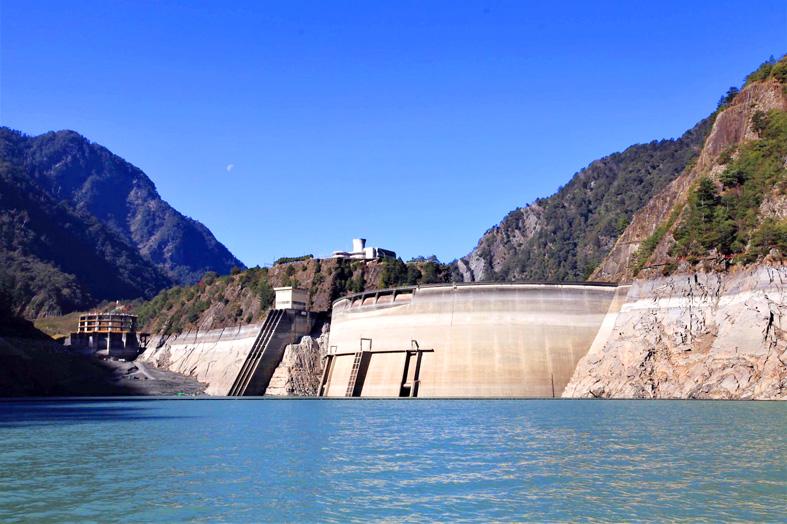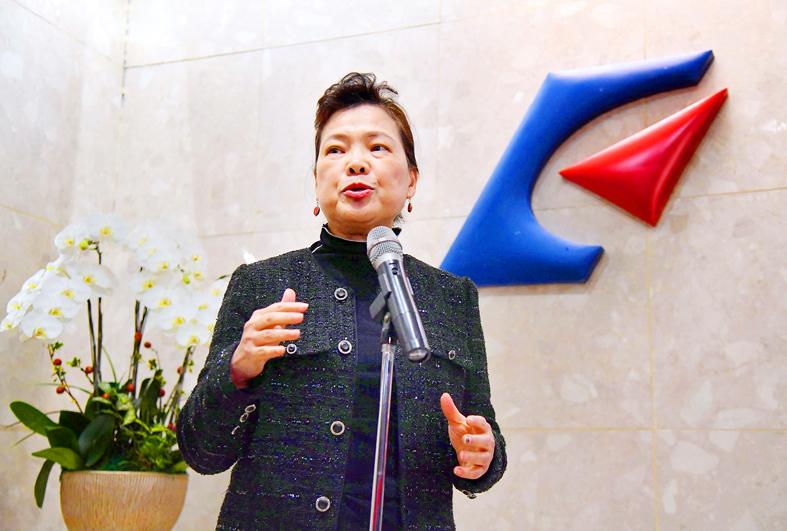After a typhoonless year and an unusually dry spell in the first quarter, Taiwan is counting on alternative sources of water to ensure a steady supply until the arrival of the wet season, Minister of Economic Affairs Wang Mei-hua (王美花) said yesterday.
Wang also defended the ministry’s strategy of proactively developing emergency wells to increase the nation’s water supply, including granting permission to companies in the Hsinchu Science Park (新竹科學園區) to drill wells.
No possible alternative source of water will be overlooked, including wells, desalination and water reclamation, she said.

Photo: CNA
“This is undoubtedly the most serious drought since 1967,” Wang told a press briefing. “We usually get an average of more than 100mm of spring rain, but so far this year, we only had 20mm,” she said.
Spring rain refers to rainfall from February to April.
“The reason we still have water now is because we have been prepared,” she said. “We have increased our backup water supply and used pipelines to transport water where it is needed.”

Photo: CNA
Wang’s remarks came after water levels in six reservoirs across the nation fell below 20 percent of capacity, despite rainfall in the past few days.
As of 12pm yesterday, the water levels at Baoshan Second Reservoir (寶二水庫) in Hsinchu County, as well as Yongheshan Reservoir (永和山水庫), Mingde Reservoir (明德水庫) and Liyutan Reservoir (鯉魚潭水庫) in Miaoli County, were at 12.43 percent, 11.81 percent, 10.64 percent and 15.08 percent of capacity respectively, while Deji Reservoir (德基水庫) in Taichung and Zengwen Reservoir (曾文水庫) in Chiayi were at 10.19 percent and 15.22 percent of capacity, figures from the Water Resources Agency showed.
Wang said the government has spent NT$1.96 billion (US$69.25 million) on drought-prevention measures since 2018 amid concern over climate change-related extreme weather patterns.
The nation’s 1,200 emergency wells were surveyed and 87 new wells were dug, while 160 emergency wells are currently in use, she said.
A pipeline also carries water from Taoyuan to Hsinchu, where the water situation has reached “orange alert” levels and water pressure has been reduced around the clock, she said.
Some have said that relying on wells is a shortsighted solution that could have unintended consequences.
Former minister of the interior Lee Hong-yuan (李鴻源) said on TV that it could cause land subsidence.
“The science park uses at least 200,000 to 300,000 tonnes of water a day,” Lee said on the Direct Interaction Live (互動直播LIVE) program. “What if satisfying this supply with groundwater causes land subsidence? Would it damage precision manufacturing equipment in the park? Who will take responsibility for the possible consequences?”
Wang said the request to drill more wells came straight from the Hsinchu Science Park firms and only wells in areas with “plentiful groundwater supply and without risk of subsidence” would be approved.
Emergency wells in Hsinchu would only be used to cover an emergency shortfall rather than for daily use, Water Resources Agency Deputy Director-General Wang Yi-feng (王藝峰) said.
Once approved, an emergency well would take about 50 days to dig, he said.
As climate change causes extreme weather patterns, Taiwan’s long-term plan to increase its backup water supply goes beyond wells, Wang Yi-feng said.
“We have 11 water reclamation projects that are ongoing. We expect at least one new facility to come online every year,” he said.
Currently, only one water reclamation plant in Kaohsiung’s Fongshan District (鳳山) is operational, producing 45,000 tonnes of water a day for China Steel Co (中鋼), he added.
The nation is still on track to provide adequate water for household and industrial users until the end of May, when the rainy season starts, the minister said.
Meteorologists have forecast that rainfall next season would be “average to trending low,” she said.

US President Donald Trump yesterday announced sweeping "reciprocal tariffs" on US trading partners, including a 32 percent tax on goods from Taiwan that is set to take effect on Wednesday. At a Rose Garden event, Trump declared a 10 percent baseline tax on imports from all countries, with the White House saying it would take effect on Saturday. Countries with larger trade surpluses with the US would face higher duties beginning on Wednesday, including Taiwan (32 percent), China (34 percent), Japan (24 percent), South Korea (25 percent), Vietnam (46 percent) and Thailand (36 percent). Canada and Mexico, the two largest US trading

AIR SUPPORT: The Ministry of National Defense thanked the US for the delivery, adding that it was an indicator of the White House’s commitment to the Taiwan Relations Act Deputy Minister of National Defense Po Horng-huei (柏鴻輝) and Representative to the US Alexander Yui on Friday attended a delivery ceremony for the first of Taiwan’s long-awaited 66 F-16C/D Block 70 jets at a Lockheed Martin Corp factory in Greenville, South Carolina. “We are so proud to be the global home of the F-16 and to support Taiwan’s air defense capabilities,” US Representative William Timmons wrote on X, alongside a photograph of Taiwanese and US officials at the event. The F-16C/D Block 70 jets Taiwan ordered have the same capabilities as aircraft that had been upgraded to F-16Vs. The batch of Lockheed Martin

China's military today said it began joint army, navy and rocket force exercises around Taiwan to "serve as a stern warning and powerful deterrent against Taiwanese independence," calling President William Lai (賴清德) a "parasite." The exercises come after Lai called Beijing a "foreign hostile force" last month. More than 10 Chinese military ships approached close to Taiwan's 24 nautical mile (44.4km) contiguous zone this morning and Taiwan sent its own warships to respond, two senior Taiwanese officials said. Taiwan has not yet detected any live fire by the Chinese military so far, one of the officials said. The drills took place after US Secretary

THUGGISH BEHAVIOR: Encouraging people to report independence supporters is another intimidation tactic that threatens cross-strait peace, the state department said China setting up an online system for reporting “Taiwanese independence” advocates is an “irresponsible and reprehensible” act, a US government spokesperson said on Friday. “China’s call for private individuals to report on alleged ‘persecution or suppression’ by supposed ‘Taiwan independence henchmen and accomplices’ is irresponsible and reprehensible,” an unnamed US Department of State spokesperson told the Central News Agency in an e-mail. The move is part of Beijing’s “intimidation campaign” against Taiwan and its supporters, and is “threatening free speech around the world, destabilizing the Indo-Pacific region, and deliberately eroding the cross-strait status quo,” the spokesperson said. The Chinese Communist Party’s “threats